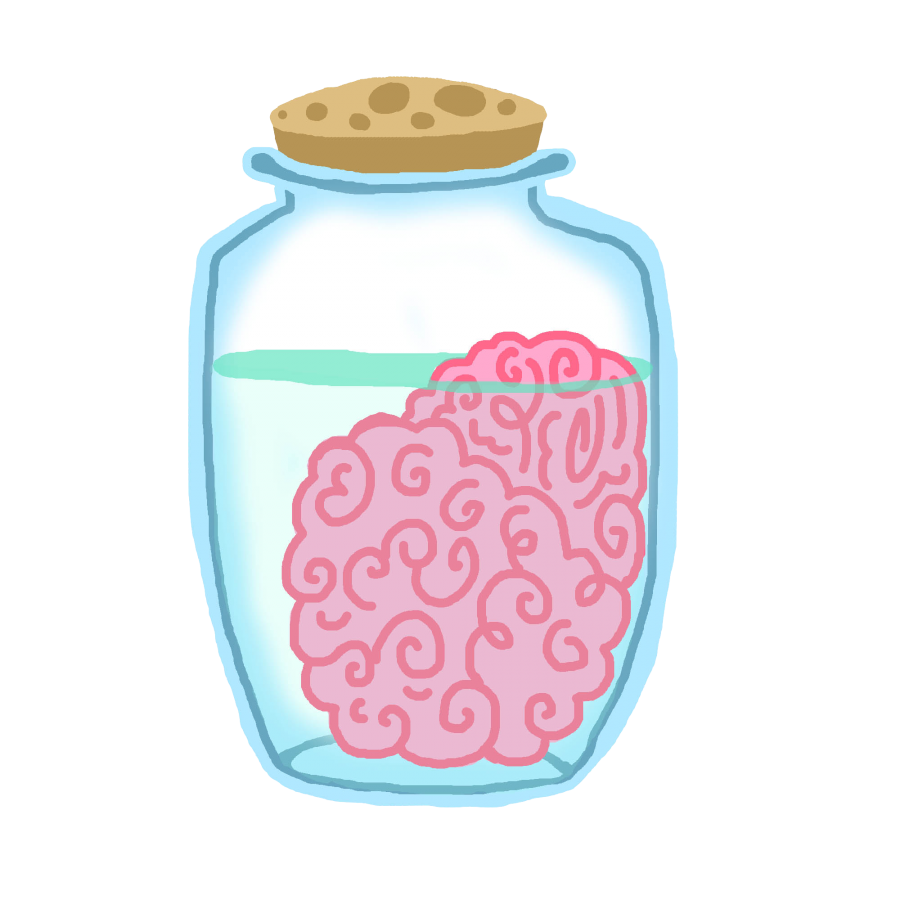Breaking the stigma: mental health on campus and in the culture
One in five. Twenty percent. Theoretically, nearly 100 Archer students.
That’s how many adolescents, ages 13 to 18, currently live with or will develop a serious mental illness in their lifetime, according to the National Alliance on Mental Illness.
Eleven percent of youth have a mood disorder, 10 percent have a behavioral or conduct disorder and eight percent have an anxiety disorder. And in 2015, the National Institute of Mental Health estimated that three million adolescents aged 12 to 17 in the United States had at least one major depressive episode. That’s 12.5 percent of the demographic’s population.
According to school counselor Patty Lancaster, Archer’s relation to these statistics is “normal” — that is, a statistically consistent portion of its student body deals with mental health issues.
“Like any other school, when you have 480 teenagers in one place, you’re going to have the same percentages,” she said. “I think the school is pretty understanding to allow accommodations for when somebody goes through something that’s really difficult. We try to educate the teachers and the students to be self-aware and to know, what are the signs? Am I depressed, or am I anxious, and what kind of help do I need to get for that?”
Yet, in the world at large, many still view discussions of mental health as an unspeakable taboo. In a study conducted by Britain’s Time to Change campaign, nearly 30 percent of those surveyed said they would find it difficult to publicly admit to suffering from a mental illness, versus 20 percent who said they would have difficulty coming out as gay. And nine in 10 people reported facing stigma and discrimination because of their mental health problem.
More common than you think
Sophomore Sarah Traenkle first became aware of her own mental health at a young age, when she was diagnosed with Attention Deficit/Hyperactivity Disorder (ADHD).
“When I was younger, I’d always had trouble focusing and what not, and I was diagnosed with ADHD, which is a common thing,” she said. “And then last year, coming into high school, my ADHD was really full blown, and then I also got diagnosed with anxiety and depression.”
She described a feeling of shame stemming from the idea that people would know she took prescription medication for her mental condition.
“I just felt like it was kind of this weight that was put on my shoulders that shouldn’t necessarily be there because it’s a common thing that people go through,” she said. “But just knowing that someone has depression or anxiety, it’s like — it’s something that you don’t want people to know, but they do. And I just felt very self-conscious about it.”
Traenkle emphasized the efforts she made to overcome the stigma.
“It was always a thing, saying, ‘Hi, I’m Sarah, this is how I am,” she said. “It’s always been hard to talk about, but now with me talking about it more, [I’m] spreading the word so that people don’t have to feel like that. I want to try and make it more of a positive thing, so other people can have a more positive experience if they have a mental health disorder.”
As a part of her efforts to bring awareness to mental health, Traenkle “opened up” to her friends and community, who, to her relief, were accepting.
“Throughout time, it’s just been a part of me, so they’ve adapted to it,” she said.
She has also worked to fundraise and educate for Bring Change to Mind, an organization that works to “end the stigma and discrimination surrounding mental illness.”
“When someone hears mental health, they immediately go to, like, depression or anxiety, or think, ‘They might be suicidal,’ and that’s not everything that’s around mental health,” Traenkle said. “There’s so many other things, like ADHD and eating disorders.”
“And instead of people being put down because they have this, they should be brought up and told that it’s fine,” she continued. “Other people should help them with coping with it, instead of just sticking to that one stigma.”
Compassion is key
Lancaster said that Archer strives to be “compassionate and understanding” when dealing with issues of mental health.
“Mental health is a big topic,” she said. “I see mental health as a part of [general] health, so mental health is a balance. Of course, you go through episodes where there’s really tough spots, and people need to be supported through a mental health crisis. Or it can be hereditary. But in general, mental health is sleep, balance, knowing yourself well and what you need, exercise, not spending too much time in things that disturb you.”
She pointed to options for support in Archer’s curriculum and student services.
“I think that Archer does a good job of addressing [mental health] in Human Development; in trying to have students be in advisory talking about how they’re doing and their balance; [and] trying to encourage students not to take too many [heavy] class-loads at once, even though they will because they want to,” she said. “And then [we’re working on] educating ourselves to try and understand that mental health issues are common and that 25 percent of the population goes through something, especially when we’re teenagers.”
She described mental health treatment as a self-reflective, educational experience for affected students.
“Sometimes it’s really just [about] learning about our brain and our sensitivities,” she said. “That’s when sometimes going out and getting outside therapy is kind of like a continuation of education, like ‘I’m going to learn about myself, and I’m going to learn to understand what I need.’ That’s what counseling is about — who am I, and what do I need?”
According to Lancaster, the broader cultural response to mental illness has “gotten a lot better” in recent years.
“I hear more and more families being understanding or accepting of their daughters really having something that needs addressing and attending to, rather than just, ‘Oh, get over it,’” she said.
Still, as an American culture, Lancaster recognized that stigma and taboo around mental illness has been difficult to erase.
“It’s been a long road to accept [it], because we’re kind of like, ‘tough it out.’ One of the ways that you can see this is in the armed services, with soldiers coming back from war zones, having PTSD and [developing] addictions,” she said. “There’s a lot of problem with addiction in the country, and they’re [finally] looking at it not like a moral weakness but as something that really needs to be medically addressed.”
Tackling the “stigma”
Also hoping to help break the stigma around mental health is sophomore Stella Smyth, who co-leads Archer’s recently founded Mental Health Club. The club was born out of Smyth’s experiences working at Teen Line, a peer-to-peer hotline for teens.
“Once I got on the phones at Teen Line, I realized, after a couple suicide calls that I’ve gotten, actually hearing another person saying ‘I feel like you’re the only one who’s ever understood what I’m going through,’ and the emotion in their voice — it’s so impactful,” she said. “I’d hate to see one of my friends struggling through that, and that kind of got me thinking about how we [didn’t] really have anything like that at Archer. Where would my friends go if they needed more information about how they’re feeling? So that’s why I started Mental Health Club.”
The club meets Mondays at lunch, and according to Smyth, focuses on discussing “issues surrounding mental health.”
“We talk about why having mental illness seems like a bad thing, even though it’s not and it’s actually completely normal,” she said. “[We’re] basically just normalizing topics surrounding mental health, and also talking about mental health in the media, how it’s depicted and how that can be negative.”
Smyth expressed concern about the “insensitive,” dismissive words she’s heard from fellow Archer students regarding mental illness.
“I think [the biggest problem] is the stigma that surrounds mental health and the way that people talk about mental health,” she said. “Phrases like, ‘I hate this, I’m going to kill myself,’ or ‘Oh, that’s so depressing, I’m depressed now.’ It’s so insensitive and that’s the problem I see around Archer. I think that’s just a lack of awareness about it because usually, the people who are using those phrases aren’t aware of the effects that can have on others.”
She hopes the club can tackle this sort of negative culture on campus.
“I think it needs to start with shutting down conversations where you’re competing about how stressed out you are and how much sleep you didn’t get,” she said. “That’s really unhealthy and I don’t even know why that happens. [We should be] taking away those conversations and replacing them with positive conversations, like ‘Oh, I went to sleep at 9 last night and I’m really ready.’ And also just being more supportive and being there for your friends, and being more aware of the kind of impact that your words have on others. That would be a really great place to start.”
Smyth also intends to prompt a conversation about the media’s portrayal of mental illness and its effect.
“Mental health in the media is very situational,” she said. “Something needs to happen in order for someone to be sad, and sometimes [in real life] that’s not always true. Someone can just have depression. I think that’s really insensitive, and it paints this picture in the media that we need to have bad things happen to us in order to be sad, and that’s just not true. You can feel sad without needing a reason. It’s valid.”
Getting help for an invisible illness
Junior Sara Friedman had always felt that something about her brain was a little different.
“I always felt like I had a type of issue, like my thoughts — I process them differently, and I always thought that it was — I didn’t really know what it was, but I knew it had to be something,” she said.
It wasn’t until she was diagnosed with an anxiety disorder and ADHD that things started to make sense for Friedman.
“I’ve learned that I’ve needed all of these accommodations with learning and that I’ve gone so long without it, and it’s really weird to think about,” she said. “It’s hard because I realized how hard I had to work because I needed these accommodations that I wasn’t getting because I didn’t know about it.”
The newfound information came with some frustrations, however.
“Since I was diagnosed with ADHD, I was approved to get extended time, so then I was also approved to get extended time on the ACT and SAT,” she said. “So then there were a lot of comments from people because since I only got it this year, people were like, ‘You don’t need it, what are you talking about?”
She remembers encountering disbelief and misconceptions.
“People think that my parents just paid a lot of money for me to get it, but it’s like, no, that’s not really what happens. I couldn’t even afford that,” she said. “So that’s been hard, because a lot of people don’t really believe that I need extended time and that I actually have these issues, and it’s like, I can show you the 20-page report that my psychiatrist wrote. I can show you. So that’s just been a hard thing. With testing, people are like, ‘Oh, it’s so much easier when you have extended time,’ but it’s not because it’s just like regular time [for me].”
Friedman believes that these misunderstandings are rooted in the invisibility of such mental illnesses and can be encouraged by a culture of competition.
“The thing about mental disabilities is that obviously when you have a physical disability, it’s seen,” she said. “So people are like ‘Oh of course,’ because they can see that people are walking on crutches, or in a wheelchair, and it’s very visible. But the thing is, mental disabilities are not. So it’s hard because you don’t know what the actuality is of someone’s case.”
She echoed Smyth’s concerns about stress one-upmanship.
“There’s kind of a competition with who’s the most stressed out, and people play to it, like ‘I’m this stressed out and I have an anxiety disorder!’ and ‘I have this,’ and blah, blah, blah,” she said. “You shouldn’t really be competing about that.”
Ultimately, according to Friedman, any student struggling with mental health issues should find help — whether it be “a community or one singular person” — remember that there is “no singular path” for everyone and appreciate themselves for who they are.
“It’s not a bad thing,” she said. “Because it also can make you more unique and intuitive as a person. For me, I’m so self-aware because I know exactly how I think and I know why I think certain ways and why I do certain things.”

Eloise Rollins-Fife joined the Oracle staff in 2015 and was promoted to co-Voices editor in 2016. She became the Managing/News & Features Editor for...









Sonia Arora • May 15, 2017 at 1:55 pm
Great work, Eloise! You continue to illuminate many important issues through your writing.
Best wishes,
Ms. Arora
Steve Fife • May 15, 2017 at 2:17 am
Excellent article, Eloise, on such a difficult subject – one, as you say, that still has so much stigma attached to it. So glad to hear that there is now a hotline for Archer students to call when in crisis. As you wrote, students in crisis need understanding and empathy, not judgment. Articles like yours can only help to make that happen.
Hillary Rollins • May 14, 2017 at 7:53 pm
Eloise, you rocked it with this article! And brought tears to my eyes, too, because I was one of those kids with high intelligence and talent but learning “differences” that affected my ability to take tests and finish projects. Instead of being understood and supported with accommodations, like some kids are today, I was stigmatized for being “lazy” and so forth – “You’re so intelligent, you just don’t apply yourself!” I would try to apply myself, and I’d get 100% of the questions on the test that I answered right – but I”d only have time to answer half of them (because I needed more time on tests, etc.) so I’d end up with a score of 50! Eventually I just gave up and dropped out of school and found my future another way. But the path was rough. I’m so glad you girls have better options – let’s keep moving forward in mental health!
Elizabeth English • May 13, 2017 at 9:44 pm
Thank you, Eloise for yet another beautifully written and illuminating article. I know it has and will continue to stimulate a lot of important conversation around campus. Great work!
Halle • May 12, 2017 at 1:42 pm
Great topic that definitely needs to be discussed! And well written as well
Anna Brodsky • May 11, 2017 at 11:39 pm
Fantastic article, Eloise! Thank you for covering this very complex topic with sensitivity, skill and integrity.
Khanh Nguyen • May 11, 2017 at 8:23 pm
Wow, I had no idea this was such a prevalent issue! You’ve done great work, Eloise. What an enlightening article!
Yen Khe Nguyen • May 11, 2017 at 8:17 pm
Great article, Ms. Rollins-Fife! Incredibly insightful, informative, and well-written; I am glad that you are shedding some light on such an important issue! Where can I subscribe to the Oracle?
Nelly Rouzroch • May 11, 2017 at 8:13 pm
Amazing article Eloise!
Jennifer Park • May 11, 2017 at 4:07 pm
Eloise! Great job on this article! I actually wrote an article about this same topic about overcoming the stigma of mental illness for a newspaper that I write for and your article was even better than mine! It’s an important topic for me because I did a lot of volunteer work people with mental disabilities. Really informative and well written. Love you Eloise
Haben • May 11, 2017 at 3:31 pm
enlightening post on a very important issue. great work!
Alexandra Chang • May 11, 2017 at 3:28 pm
Amazing article, Eloise! Thank you for shedding light on such an important topic. Great work <3